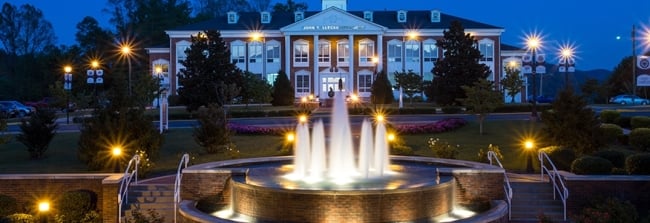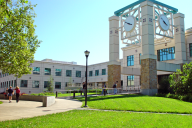You have /5 articles left.
Sign up for a free account or log in.

University of the Cumberlands
The University of the Cumberlands does not have to pay its retired president hundreds of thousands of dollars in annual compensation for the rest of his life, a nine-member jury ruled Friday, capping a trial that stretched over two weeks and was unusual for even making it to the courtroom.
Jurors found against James Taylor, the former president of the private University of the Cumberlands in Williamsburg, Ky., and his wife, Dinah. In 2016, the Taylors sued the university in U.S. District Court for the Eastern District of Kentucky alleging breach of contract. The university was not upholding an agreement reached before Taylor’s retirement that would have paid him lifetime salary and benefits worth at least $395,000 per year, they alleged.
The Taylors were seeking a $4.5 million lump-sum payment, but the jury ruled the university does not have to pay, according to the Lexington Herald-Leader.
A 2012 contract promising lifetime salary and benefits to Taylor and his wife equaling what they received when he retired was signed by the then president and the university’s former Board of Trustees chair. But the university questioned details about that agreement, as well as the integrity of other documents that indicated the package had been approved.
University lawyers argued trustees never approved the contract terms and that the agreement was not valid or enforceable.
Experts in both the legal and compensation fields were surprised upon reviewing the case’s details. Most cases involving high-stakes disagreements over executive compensation are settled out of court because neither side wants the negative publicity that comes with a bruising trial. Cases where a signed contract can be found are usually open-and-shut affairs.
And the type of compensation in question also struck many as unusual. In addition to salary, the agreement in question would have covered the Taylors’ long-term health-care costs, assisted living facility costs, an apartment or residence for the Taylors in Williamsburg and a university-provided $200-per-month apartment for Taylor’s brother and sister-in-law. Dinah Taylor was also to be the beneficiary of a $1 million life insurance policy that the university purchased.
Taylor, who is now 73, retired in 2015 after 35 years as president of the University of the Cumberlands. His lawsuit argued he’d been promised a set of postpresidential benefits as early as 2005.
That year, the university’s board voted to make Taylor chancellor upon his retirement and to continue the compensation and benefits he and his wife were receiving before they retired. He would keep receiving compensation and benefits until his death, at which point his wife would continue receiving them if she was still alive.
In 2012 the board executed a contract paralleling the 2005 vote, and the package was “unanimously reconfirmed” by the board again on the day Taylor stepped down from the presidency in 2015, the lawsuit said. But after he retired, the university offered him a one-year renewable contract at a lower salary of about $152,000, it said. Then in the summer of 2016, the university stopped paying many of the benefits in question, including salary.
The university in turn argued that the agreement was never presented to or approved by its Board of Trustees and that its former chair did not have the authority to sign the 2012 agreement.
Although written documents seemed to show approval, lawyers raised questions about who wrote certain notes. Some trustees later said they didn’t recall voting for the agreement or that a contract wasn’t approved, press accounts show.
Taylor “devised a scheme” to secure retirement benefits, the lawyer representing the university, Barbara B. Edelman, said during trial, according to the Herald-Leader. The president had his friend and board chairman sign the agreement, which another friend had drafted, she said. She added that the agreement didn’t appear on meeting agendas where it should have and hadn’t been properly filed in university records.
“You pay us forever and we don’t have to do anything. What a sweetheart deal,” Edelman said, according to the Herald-Leader. “Over $350,000 a year to not do anything is ungodly.”
But the contract was indeed legal, argued the lawyer representing the Taylors, John M. Sosbe. Taylor had been a successful fund-raiser, and the board knew keeping him working for the university after retirement would be valuable, Sosbe said.
“Ladies and gentlemen, Dr. Taylor’s worth to the board, to the university, can’t be overstated,” Sosbe said, according to the Herald-Leader’s account.
The university’s current president, Larry Cockrum, issued a statement after the jury reached its decision.
“I am very pleased the jury agreed with the position the university has taken for more than three years,” it said. “This verdict allows the university to direct all of its resources toward its mission of providing a quality, affordable education to students from all backgrounds. While this lawsuit should never have been brought, our Board of Trustees will continue to appreciate the contributions Dr. and Mrs. Taylor made to University of the Cumberlands, and to wish them well.”
Taylor’s supporters voiced disappointment in the ruling. One, who asked not to be identified because of a longtime affiliation with the university, maintained that the president had dedicated his life to the university and its students. The supporter said Taylor received relatively low pay for a university president while he was employed and worked longer than he might have if he hadn’t been promised postemployment benefits.
Indeed, some former university employees spoke highly of Taylor, according to local press accounts of the trial. Sue Wake, a former vice president of institutional advancement and special assistant to the president, testified in court that she didn’t believe he would lie about the contract issue.
“He is a man of integrity,” Wake said, according to the News Journal.
Duane Cook, a lawyer representing the Taylors, said in an email that said he was "stunned and saddened by the jury decision" and that getting to know Jim and Dinah Taylor had been one of the great privileges of his life.




